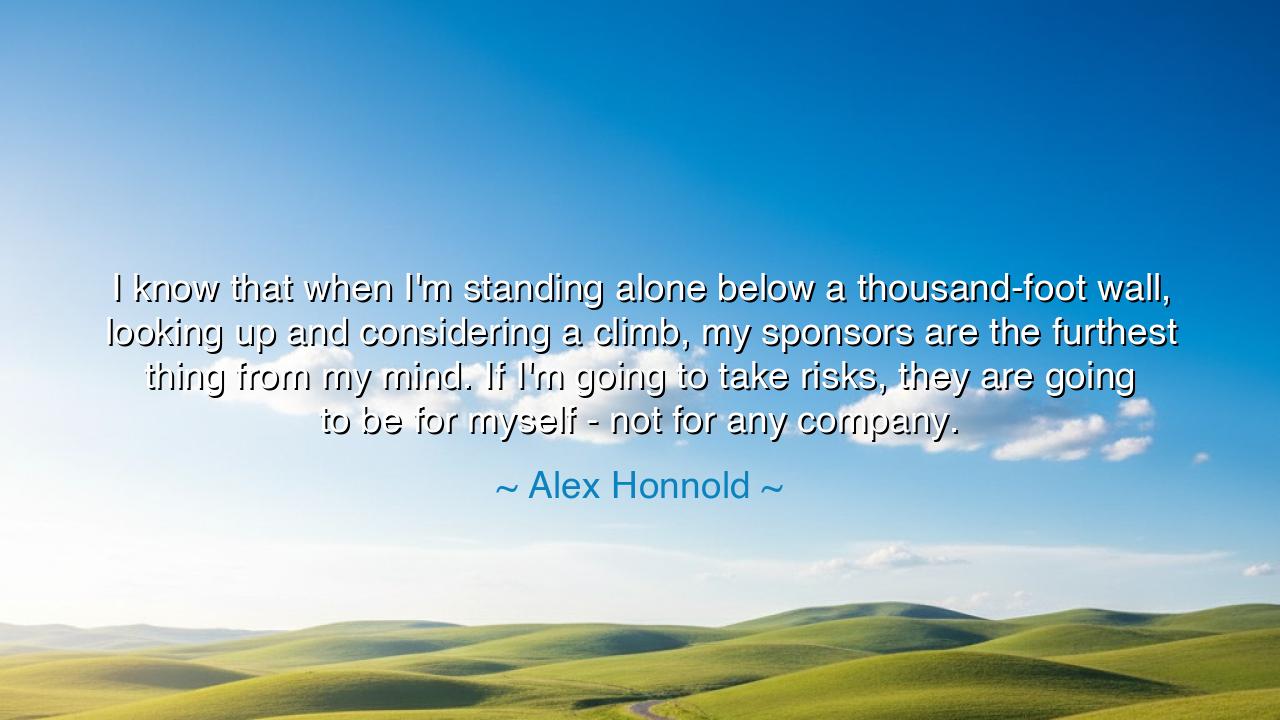
I know that when I'm standing alone below a thousand-foot wall
I know that when I'm standing alone below a thousand-foot wall, looking up and considering a climb, my sponsors are the furthest thing from my mind. If I'm going to take risks, they are going to be for myself - not for any company.






“I know that when I'm standing alone below a thousand-foot wall, looking up and considering a climb, my sponsors are the furthest thing from my mind. If I'm going to take risks, they are going to be for myself — not for any company.” — thus spoke Alex Honnold, the climber who has walked upon the edges of mountains as calmly as other men walk upon the earth. In these words lies not only the philosophy of a mountaineer, but the creed of a free spirit — one who refuses to let the world claim ownership over his courage. Honnold speaks with the voice of a man who has stared into the abyss of fear and found within himself the only reason worth risking life: to live truly, and for one’s own soul.
Honnold is known across the world for his free solo climbs — those ascents where he climbs sheer, towering cliffs without ropes, without safety, without another human hand to catch him if he falls. His most legendary feat, the ascent of El Capitan in Yosemite National Park, was an act that defied human limits, a ballet with death performed upon the face of stone. Yet, even surrounded by the applause of millions and the admiration of sponsors and spectators, he reminds us that true courage cannot be bought, nor performed for others. When he stands at the foot of the mountain, it is not fame, fortune, or expectation that fills his heart, but the silence of his own purpose.
His words strike at the very heart of authenticity — that sacred state of living where one’s actions spring not from obligation or vanity, but from inner truth. To take risks for the sake of others’ approval is to trade the purity of the spirit for hollow applause. Honnold’s declaration is a rejection of that temptation. He tells us that the highest acts — whether of art, of creation, or of courage — must be self-chosen and self-owned. A man who risks his life for others’ praise becomes their servant; a man who risks it for the call of his own heart becomes free.
In this, Honnold echoes the wisdom of the ancients. The warrior Achilles, when offered a long life of comfort or a short life of glory, chose the path that was his own, knowing it would end in death. The philosopher Diogenes, who lived in a barrel, rejected the world’s wealth and honor to preserve the freedom of his soul. And so too, in his own way, Honnold stands beneath his towering cliffs as they did before their fates — guided not by the promise of reward, but by the truth that meaning is born only from choice. To live without that freedom is not to live at all.
There is something deeply spiritual in the image of a man alone before a mountain. The mountain is the symbol of life’s greatest challenge — vast, indifferent, eternal. To climb it is to declare that one’s own will matters, that the human spirit can rise even against the impossible. But the moment that act becomes performance, the moment it is done for others, its sacredness fades. Honnold’s words remind us that solitude before greatness is where true integrity is tested. When no one is watching, and no applause will follow, will you still dare to climb?
Yet his message is not only for climbers or adventurers — it is for all who seek to live truthfully. In every life there are walls to climb: the pursuit of a dream, the defense of one’s beliefs, the endurance of pain, the act of love. We are all asked, in our own ways, to risk something. The question Honnold poses is this: Who are you doing it for? If the answer is the world, then your strength will falter when the world turns away. But if the answer is your own soul, then even in solitude, you will stand firm — for you will be sustained by the quiet fire of purpose.
Lesson: Let your risks be your own, and let your courage serve not your reputation, but your truth. When you stand before the great walls of your life — the challenges that rise like stone before you — remember that only what is freely chosen holds real meaning. Seek not approval; seek alignment with your inner calling. When you act from that sacred center, you will find a power that no reward can match.
Thus, Alex Honnold’s words become more than the confession of a climber — they are a philosophy of life. The world will always offer rewards for compromise, and applause for imitation. But the path of the authentic soul is narrow and steep, and it must be walked alone. Climb for yourself, live for yourself, and let your highest acts be the echo of your truest self. For in the end, the summit reached for others will be forgotten, but the summit reached in solitude — that one becomes eternal.






AAdministratorAdministrator
Welcome, honored guests. Please leave a comment, we will respond soon